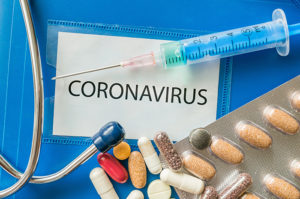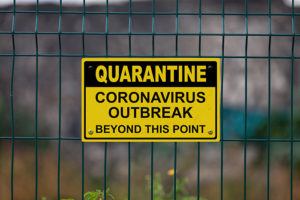By Chris Turner
[email protected]
 FRANKLIN — Topping the news globally is COVID-19, also known as the Coronavirus. The flu-like virus is on the radar of the World Health Organization and being monitored for signs of an international pandemic.
FRANKLIN — Topping the news globally is COVID-19, also known as the Coronavirus. The flu-like virus is on the radar of the World Health Organization and being monitored for signs of an international pandemic.
However, panic may be spreading more rapidly than an actual pandemic, and Tennesseans are concerned how they might be affected. Their question, especially concerning those gathering in churches, is, “What should we do?”
The initial response is simple: Don’t panic. In a recent Washington Post interview, Dr. Anthony Fauci, director of the National Institute of Allergy and Infectious Diseases, said that, “Right now the risk to the American public is low.”
That status could of course change, Fauci said, depending on what happens around the rest of the world, but right now there is not a widespread threat in the United States. The Center for Disease Control affirmed this position, stating on its website that, “at this time, this virus is NOT currently spreading in the community in the United States.”
What fuels potential panic over the coronavirus is a lack of understanding as to what kind of disease it is. While information is still to be gathered, one important item that is known about COVID-19, the actual disease caused by the novel coronavirus, is that it is respiratory in nature, as is the flu.
While there currently is not a vaccine for it, experts say there are some tried and true methods for dealing with this type of illness. The most basic: Frequently wash your hands with soap for 20 seconds and cover your mouth and nose when you sneeze. (See sidebar below for CDC recommended steps to prevention).
“The most important thing right now is to remain calm,” Saskia V. Popescu, a senior infection-prevention epidemiologist for a Phoenix-based hospital system told the Washington Post.
“Remember, we don’t have that many cases in the U.S., and prevention strategies for this coronavirus are not new,” Popescu continued. “We’ve been doing them for years.”
Right now, the bigger threat in the U.S. is influenza, the common flu, that has certainly had its impact in Tennessee, shutting down several school systems and keeping many people out of work. Nationwide, the flu has claimed 10,000 lives during this flu season.
Randy C. Davis, executive director of the Tennessee Baptist Mission Board, said it is important for churches to “double-down” on prevention.
“This is obviously a serious situation globally and we should monitor what’s going on,” he said.
“However, we also don’t need to get swept up on the sensationalism that is flooding some news outlets. What we can do is be diligent in doing what we know we ought to do all the time anyway.
 This includes things like wiping down children’s areas and other highly trafficked locations in our churches with disinfecting wipes, washing our hands, make hand sanitizer available, and staying home when we are sick so we don’t infect others.”
This includes things like wiping down children’s areas and other highly trafficked locations in our churches with disinfecting wipes, washing our hands, make hand sanitizer available, and staying home when we are sick so we don’t infect others.”
Davis also said Tennessee Baptists need to look beyond their churches in prayer.
“We need to remember our Southern Baptist missionaries located around the world, many of them in places where the exposure to the Coronavirus is high,” he said. “While our risks here may be very low at this time, we have brothers and sisters in Christ who have gone out from our churches to serve the people of the world and we need to lift them up.”
“Pray for their protection and pray this might be an opportunity for them in some way to lead people to Christ,” he said.
Davis added that many Tennessee Baptists are scheduled soon to go on overseas mission trips, and he said there is no need at this time to cancel those plans.
“We are keeping a close watch on the places we have teams going through partnership missions and we will be in contact with those team leaders if we receive information that could impact their plans,” he said.
“We are following this issue on a daily basis and how it might impact our churches. As warranted, the TBMB will pass on practical responses in helping churches deal with a crisis.”
For more comprehensive information from the CDC regarding the coronavirus, visit: https://www.cdc.gov/coronavirus/2019-ncov/index.html. B&R
PRACTICAL TIPS FOR PREVENTING THE SPREAD OF VIRUSES
The Center for Disease Control recommends the following actions to prevent the spread of the coronavirus and all respiratory illness.
- Avoid close contact with people who are sick.
- Avoid touching your eyes, nose, and mouth.
- Stay home when you are sick.
- Cover your cough or sneeze with a tissue, then throw the tissue in the trash.
- Clean and disinfect frequently touched objects and surfaces using a regular household cleaning spray or wipe.
- Follow CDC’s recommendations for using a facemask.
- o CDC does not recommend that people who are well wear a facemask to protect themselves from respiratory diseases, including COVID-19.
- o Facemasks should be used by people who show symptoms of COVID-19 to help prevent the spread of the disease to others. The use of facemasks is also crucial for health workers and people who are taking care of someone in close settings (at home or in a health care facility).
- • Wash your hands often with soap and water for at least 20 seconds, especially after going to the bathroom; before eating; and after blowing your nose, coughing, or sneezing. If soap and water are not readily available, use an alcohol-based hand sanitizer with at least 60 percent alcohol. Always wash hands with soap and water if hands are visibly dirty. B&R
